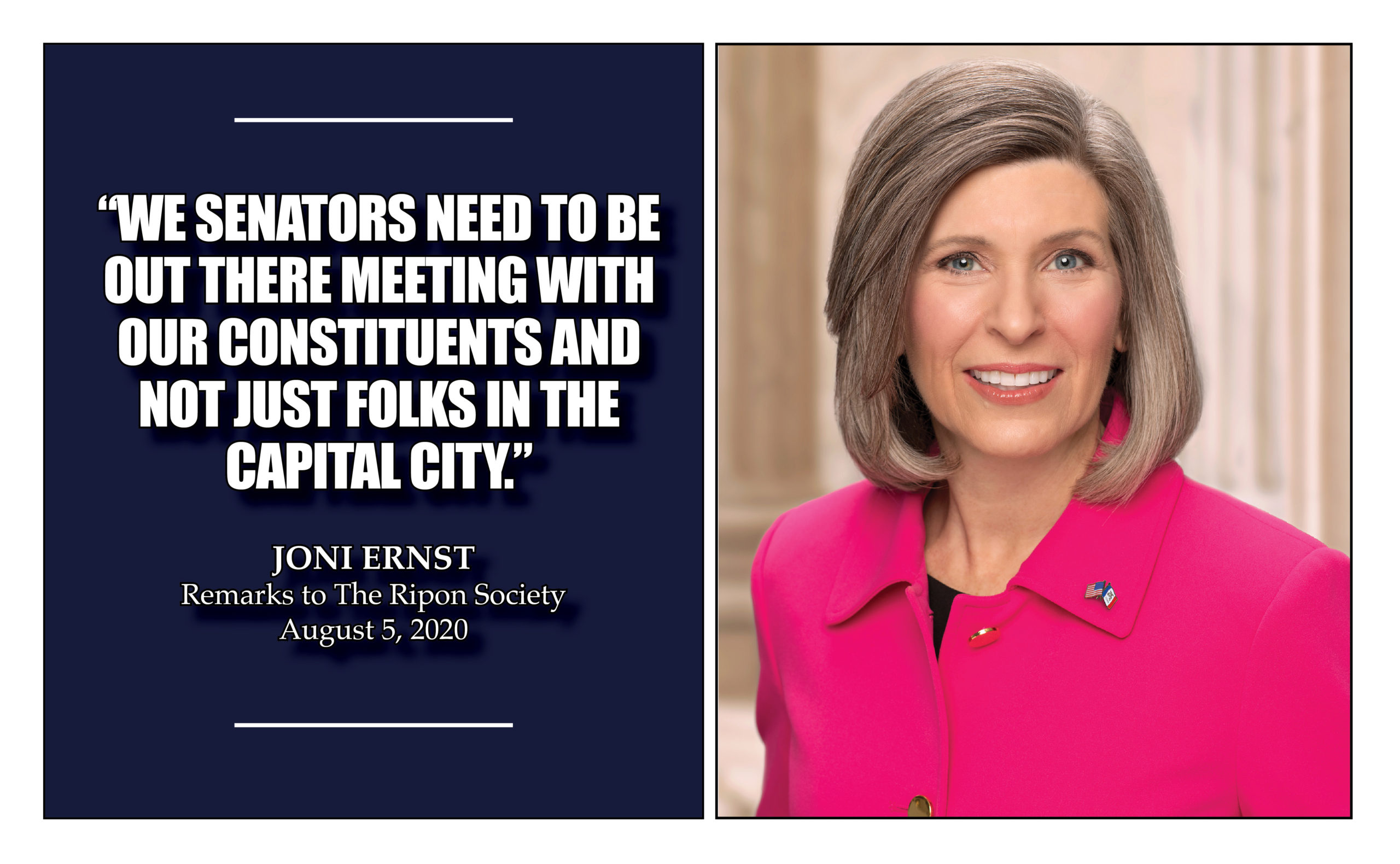
WASHINGTON, DC — Since the onset of the coronavirus outbreak in the spring, U.S. Sen. Joni Ernst (R-IA) has been working hard on behalf of her fellow Iowans, navigating the unprecedented economic and public health obstacles being faced by communities at home and across the country.
To give an update on the state of the pandemic in Iowa, and to outline what she has been doing to help in Washington, Ernst participated in a virtual discussion held by The Ripon Society on Tuesday afternoon. She kicked off her remarks by addressing the top concerns she hears from her constituents as she travels across the state throughout her annual 99 County Tour.
“A number of issues that have come up recently,” Ernst explained, “and of course COVID-19 is at the top of everybody’s concerns. More specifically, one of the issues that has come up most often is the liquidity of our small businesses. In the state of Iowa, 99% of our businesses are small businesses. By and large, I have heard positive comments about the paycheck protection program and how that has really helped our small business owners, so I am hoping that we come back in this next package and provide a second pass at those grant opportunities for those businesses that are the hardest hit.
“Rural health care has been hit hard during COVID-19. Most of the revenue streams in these rural areas come from elective surgeries. Unfortunately, because of COVID-19, those elective surgeries were stopped during the most trying phase of the coronavirus, so our rural health care providers are now struggling significantly. We know in order to maintain our rural populations, we do have to have the necessary life supporting activities like rural clinics and rural hospitals, so working through those challenges is essential right now.”
“We Senators need to be out there meeting with our constituents and not just folks in the Capital City.”
Agriculture lies at the heart of Iowa’s economy, and according to Ernst, farmers across her state are having to overcome obstacle after obstacle in order to stay afloat during this pandemic.
“We are working to ensure that our farmers are also seeing the support they need. Not only are we struggling with grain prices, but a number of our producers, primarily our swine or hog producers, had to start euthanizing their hogs because of the issues we saw at meat packing facilities due to coronavirus outbreaks. This means that they are getting nothing back from the livestock that they have invested in, plus there’s an added cost associated with depopulating their herds.
“Farmers that are engaged in row crops, like soybeans and corn, not only are they seeing very low prices for those commodities, but for those who sell to our ethanol and biofuels producing plants, they’re also seeing a hit because consumption of ethanol is down because the driving season was significantly impacted by coronavirus. All the way around, agriculture has suffered some pretty big blows.”
Following the Senator’s initial remarks, the discussion shifted to the Q&A portion of the event. The first question focused on the passage of the National Defense Authorization Act (NDAA) – one of the last few bipartisan initiatives on Capitol Hill.
“This is the 60th year in a row that we have been able to move on the National Defense Authorization Act, which is really incredible. It speaks to the Testament of the men and women that are serving in Congress and their dedication to the men and women that are wearing our nation’s uniform. It is incredibly important that we are completing the Defense Authorization Act every single year. We want our men and women to have the proper training. We need them to have the proper equipment and we need to make sure that we are doing absolutely everything within our power to make sure that, if we are committing them to our nation’s defense, they are able to remain safe.”
As the Chairman of the Senate Armed Services Committee’s Subcommittee on Emerging Threats and Capabilities, and as a combat veteran who served for over 2 decades in the military, Ernst is seen as a leading voice in Washington on matters concerning our nation’s defense.
“An area I have particularly focused on is making sure that we are keeping up with our near peer adversaries as outlined in the national defense strategy. The subcommittee that I chair is making sure that our capabilities are not just equal to our adversaries, but ahead of our adversaries. We look at things like, what can we do with artificial intelligence? We are making sure that we’re moving forward on hypersonics, quantum computing, and any type of machine learning – capabilities that will benefit our services is absolutely something that we need to be working on.”
Next, Senator Ernst was asked to touch on the progress of telehealth in her home state–– an issue that has come to the forefront in the age of COVID-19.
“Access to telehealth and making sure that we have the ability to implement telehealth, whether it is with a County hospital or within our VA healthcare system, is needed now more than ever. I have seen great results from telehealth in our rural areas with those that are struggling with substance abuse issues or mental health issues. And many times now, they can go into a rural community health clinic and they can telehealth to a psychiatrist or a psychologist or a substance abuse counselor in another community. And it has worked extremely well.
“This is making a difference, especially during COVID when sometimes folks are very uncomfortable about going to a treatment facility in person. If they can receive that type of outpatient telehealth care, they would much rather do that.”
Finally, Ernst was asked about the progress of her 99 County Tour–– an undertaking where, throughout the year, she visits each and every county in Iowa to meet and have conversations with her constituents.
“This was started 42 years ago by my Senior Senator and dear, dear colleague, Chuck Grassley. He visits every county statewide every single year, and he has never missed a County. So I’m following in his footsteps. We Senators need to be out there meeting with our constituents and not just folks in the Capital City. We should be meeting folks in every County, down to our most rural corners of the state. It’s really wonderful to be able to have that experience, and I’ve been able to gain a lot of valuable information from my hard working folks in Iowa and share it with others in Washington, DC.”
The Ripon Society is a public policy organization that was founded in 1962 and takes its name from the town where the Republican Party was born in 1854 – Ripon, Wisconsin. One of the main goals of The Ripon Society is to promote the ideas and principles that have made America great and contributed to the GOP’s success. These ideas include keeping our nation secure, keeping taxes low and having a federal government that is smaller, smarter and more accountable to the people.



